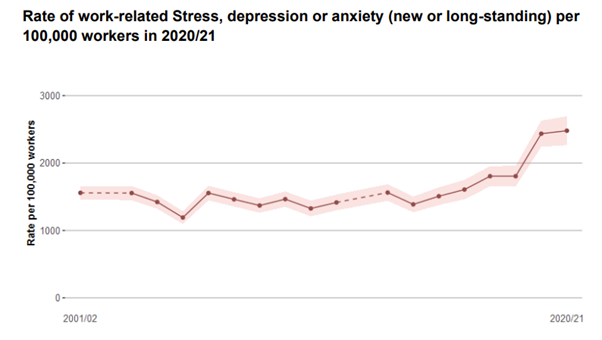
The barriers to keeping NHS staff healthy
Internal comms can help to keep NHS staff healthy – both physically and mentally – but only once we fully understand the potential blockers. This blog brings these barriers to the surface.

As an internal communicator you have a lot of strings to your bow. One of those includes educating and supporting staff with their mental wellbeing.
Stress is often overlooked and perceived to have less of an impact than other illnesses such as anxiety or depression. But for many, stress is the catalyst that leads to various mental health episodes and conditions.
Stress levels have rocketed in recent years. The chart below from the Health and Safety Executive demonstrates by just how much.

Unsurprisingly, the NHS has higher-than-average stress levels. A Government report found that NHS staff are 50% more likely to experience higher levels of work-related stress compared with the general working population. This is evidenced by the hard facts: in December 2020 stress, anxiety and other psychiatric illnesses accounted for the loss of 511,000 NHS working days.
As an organisation the NHS is very aware of the problems caused by stress. During the pandemic when NHS staff were under immense pressure, budgets and resources were expanded in an attempt to reduce the stress of NHS staff. But with excessive workloads and skills shortages there is no getting away from the fact that, for the foreseeable future, many people in the NHS will continue to experience higher than average levels of stress as a result of their job.
As an internal communicator you have the gift of reach. You can communicate with a large proportion of your staff in a way that few others in the NHS can. Below are some useful resources and ideas to help you support staff with stress (and their wider mental health).
As a society, we are now much more aware of stress and the negative impact it has. As a result, we have many more resources available to us when we experience mental illnesses. It is always good to remind staff of this help. Below is a list of support groups that could prove useful to your staff:

Our greatest weapon against stress is awareness. The more aware we are, and the more we talk about it, the more likely we are to instigate methods that reduce stress levels before we are overwhelmed.
By discussing mental health at a corporate level, we will also continue to breakdown the stigma surrounding mental health. As a communicator, there are many avenues you can take to communicate this.
We all experience stress to a certain degree. Some stress can be helpful, giving us drive and motivation. But too much stress can cause illness. Ensuring staff understand stress and how it specifically impacts them is the first step in them managing their stress levels. Rethink Mental Illness has a useful guide which highlights the signs and causes of stress, together with some guidance on managing stress levels.

In addition to the awareness mentioned above, NHS managers play a huge part in stress awareness and prevention. For many frontline staff their main source of communication is through their line manager. Here are our suggestions for a campaign that educates and supports managers:
Feeling comfortable to start a conversation about your struggles with stress or your mental health is not straightforward. There are many factors that could hold someone back such as individual circumstances, cultural beliefs, or relationships with managers. Promoting a safe culture in which staff feel able to have a conversation is vital. Ultimately, they need to know that mental health is taken seriously. Here are three ways you can spread the word:
Whilst we are busy supporting others with their stress levels and wider mental wellbeing, we can sometimes forget about ourselves. Take a moment to complete this stress test to find out where your stress levels are. At the end you’ll also receive recommendations for things you can do to reduce your own stress.
NewZapp Trusted Delivery is an internal communication email tool designed specifically for the NHS. You can create attractive email designs, send to your chosen groups of people, and then use the analytics to understand how well each of your emails has performed. Have a look to see how NewZapp Trusted Delivery could help you get your messages across more effectively.

Marketing Manager
With over 15 years’ experience in communications I have seen first-hand the difference strong internal communications can make. I am passionate about helping organisations reap the rewards of an engaged workforce and feel privileged to work for an organisation that has this same passion. We can achieve more when we work together towards the same goals.

Internal comms can help to keep NHS staff healthy – both physically and mentally – but only once we fully understand the potential blockers. This blog brings these barriers to the surface.

Staff recognition is powerful. But, despite the value it brings, as a nation, we really aren’t very good at it. This blog provides tips for quickly increasing your staff recognition.

Get in touch today to find out how NewZapp can increase the effectiveness of your internal communication.
We are NOT the NHS. We are a supplier of internal communications software. Please contact your local NHS hospital for all healthcare queries.
Tel: 01392 447200
Email: trusteddelivery@newzapp.com
Trusted Delivery is product of NewZapp Communications.
G-Cloud Digital Marketplace Documentation.
NHS Data Security and Protection Toolkit Registration.
Bradley House, Park Five Business Centre, Harrier Way, Exeter, Devon. EX2 7HU.